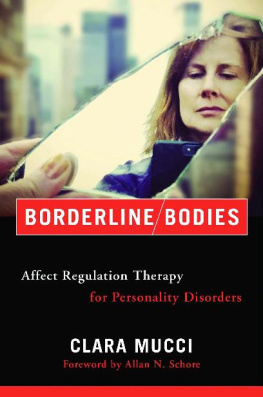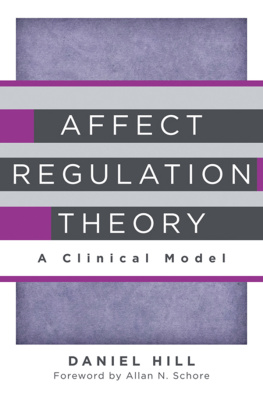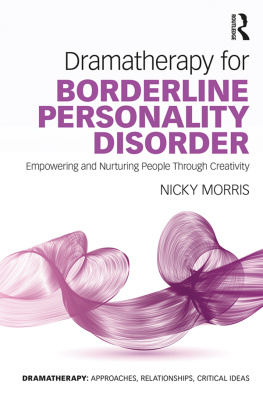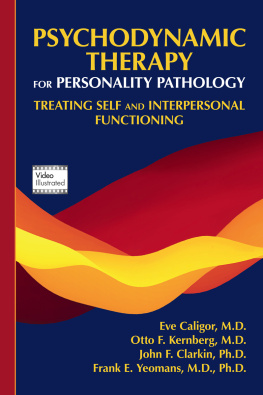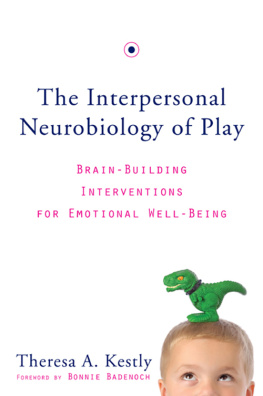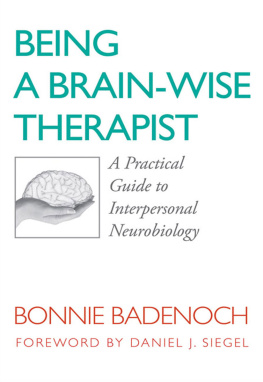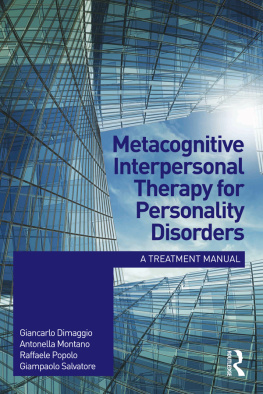Clara Mucci - Borderline Bodies: Affect Regulation Therapy for Personality Disorders (Norton Series on Interpersonal Neurobiology)
Here you can read online Clara Mucci - Borderline Bodies: Affect Regulation Therapy for Personality Disorders (Norton Series on Interpersonal Neurobiology) full text of the book (entire story) in english for free. Download pdf and epub, get meaning, cover and reviews about this ebook. year: 2018, publisher: W. W. Norton & Company, genre: Home and family. Description of the work, (preface) as well as reviews are available. Best literature library LitArk.com created for fans of good reading and offers a wide selection of genres:
Romance novel
Science fiction
Adventure
Detective
Science
History
Home and family
Prose
Art
Politics
Computer
Non-fiction
Religion
Business
Children
Humor
Choose a favorite category and find really read worthwhile books. Enjoy immersion in the world of imagination, feel the emotions of the characters or learn something new for yourself, make an fascinating discovery.
- Book:Borderline Bodies: Affect Regulation Therapy for Personality Disorders (Norton Series on Interpersonal Neurobiology)
- Author:
- Publisher:W. W. Norton & Company
- Genre:
- Year:2018
- Rating:3 / 5
- Favourites:Add to favourites
- Your mark:
- 60
- 1
- 2
- 3
- 4
- 5
Borderline Bodies: Affect Regulation Therapy for Personality Disorders (Norton Series on Interpersonal Neurobiology): summary, description and annotation
We offer to read an annotation, description, summary or preface (depends on what the author of the book "Borderline Bodies: Affect Regulation Therapy for Personality Disorders (Norton Series on Interpersonal Neurobiology)" wrote himself). If you haven't found the necessary information about the book — write in the comments, we will try to find it.
Clara Mucci: author's other books
Who wrote Borderline Bodies: Affect Regulation Therapy for Personality Disorders (Norton Series on Interpersonal Neurobiology)? Find out the surname, the name of the author of the book and a list of all author's works by series.
Borderline Bodies: Affect Regulation Therapy for Personality Disorders (Norton Series on Interpersonal Neurobiology) — read online for free the complete book (whole text) full work
Below is the text of the book, divided by pages. System saving the place of the last page read, allows you to conveniently read the book "Borderline Bodies: Affect Regulation Therapy for Personality Disorders (Norton Series on Interpersonal Neurobiology)" online for free, without having to search again every time where you left off. Put a bookmark, and you can go to the page where you finished reading at any time.
Font size:
Interval:
Bookmark:
Borderline Bodies
Clara Mucci
FOREWORD BY ALLAN N. SCHORE

W. W. NORTON & COMPANY
New York London
A NORTON PROFESSIONAL BOOK
The Norton Series on Interpersonal Neurobiology
Louis Cozolino, PhD, Series Editor
Allan N. Schore, PhD, Series Editor, 2007 2014
Daniel J. Siegel, MD, Founding Editor
The field of mental health is in a tremendously exciting period of growth and conceptual reorganization. Independent findings from a variety of scientific endeavors are converging in an interdisciplinary view of the mind and mental well- being. An interpersonal neurobiology of human development enables us to understand that the structure and function of the mind and brain are shaped by experiences, especially those involving emotional relationships.
The Norton Series on Interpersonal Neurobiology provides cuttingedge, multidisciplinary views that further our unprderstanding of the complex neurobiology of the human mind. By drawing on a wide range of traditionally independent fields of researchsuch as neurobiology, genetics, memory, attachment, complex systems, anthropology, and evolutionary psychologythese texts offer mental health professionals a review and synthesis of scientific findings often inaccessible to clinicians. The books advance our understanding of human experience by finding the unity of knowledge, or consilience, that emerges with the translation of findings from numerous domains of study into a common language and conceptual framework. The series integrates the best of modern science with the healing art of psychotherapy.
To the memory of my father,
Alessandro Mucci,
of my friend Alberto Curotto,
and of my little companion
and witness for 11 years, Sweetie
CONTENTS
BY ALLAN N. SCHORE
Over the last two decades significant advances in developmental theory, affective processes in psychotherapy, the interpersonal neurobiology of relational trauma, and psychotherapy research have generated more effective models of the treatment of borderline personality disorders, previously seen to be refractory to the talking cure. Even so, most theories of therapeutic action with these patients focus on alterations of the borderlines conscious cognitions and behavior, paying little attention to the unconscious psychopathology of the borderlines unconscious mind, or the stressful psychophysiology of the borderline body. It is these overlooked domains that this remarkable book shines light upon.
In the following pages Clara Mucci, both interdisciplinary scholar and master clinician, creatively integrates classical and modern psychoanalytic studies with recent neuroscience in order to present an overarching theoretical and clinical model for working with these difficult patients. Although she offers a wide array of clinical sources, her theoretical foundation is mainly grounded in four psychodynamic clinicians: Sandor Ferenczis seminal clinical studies of patients with a trauma history and dissociation, Otto Kernbergs work on borderline identity diffusion, Peter Fonagys work on mentalization and borderline patients, and my own neuropsychoanalytic work on early relational trauma, dissociation, and an interpersonal neurobiological formulation of early human development, centered in the unique functions of the right hemisphere, the biological substrate of the human unconscious. Indeed Mucci is unique in that she has directly studied with and been mentored by Kernberg, Fonagy, and myself.
With respect to my own work, twenty-five years ago in Affect Regulation and the Origin of the Self I utilized an interdisciplinary perspective integrating clinical studies on personality disorders, psychobiological research, and extant neuroscience in order to offer an interpersonal neurobiological formulation of the role of the body (and the autonomic nervous system) in borderline psychopathogenesis, anchored in the dysregulation of right brain attachment mechanisms. In the latter chapters The Developmental Psychopathology of Personality Disorders, Vulnerability to Psychosomatic Disease, and Psychotherapy of Developmental Disorders, I applied regulation theory to the etiology, psychopathogenesis, and treatment of what Mucci terms borderline bodies. Each of these chapters emphasized that the developing brain/mind/body is both the recipient of various relational affective stressors, as well as the source of intense dysregulating affects that lie at the core of both personality and psychosomatic disorders.
In my 2003 volumes I expanded these models in creating the construct of relational trauma, linking insecure attachment difficulties, especially disorganized-disoriented attachment and borderline personality disorder, offering a neurobiological conception of the trauma defense of dissociation, and describing fundamental implicit deficits in limbic-autonomic circuits of the right hemisphere. In each of my early books, I suggested future directions of affect regulation theory for clinical theory and treatment of the mind-body deficits of both borderline and narcissistic personality disorders (Schore, 1994, 2003a,b). Thus, at the beginning of the current century I suggested that a deeper understanding of borderline bodies was one of the next frontiers of interpersonal neurobiology, psychotherapy, and psychiatry.
Harkening back to these early explorations, Clara Mucci begins this book with my assertion that Intersubjectivity is thus more than a match or communication of explicit cognitions. The intersubjective field co-constructed by two individuals includes not only two minds but two bodies (Schore, 2012, p. 40). Following this, on the very first page she states her central thesis, that the body is the essential go-between in the relationship between self and other, and that a major clinical expression of personality disorders is not only through relational impairments but also through their stressful dysregulation of the body. Indeed, for Mucci, the body is the depository of intergenerational transmissions that are responsible for a kind of traumatic graft into the body derived from early relational trauma and subsequent affect dysregulation. To my mind this book on Borderline Bodies represents a passing of the torch, but more than an expansion and elaboration of my theoretical models, the author succeeds in creating a new fine-grained clinical vista for working more effectively with these difficult patients.
As the upcoming pages will show, Mucci offers a succinct description of the regulatory, relational, and subjective deficits that are associated with severe personality disorders: impulsivity and instability of affects in oneself and in relationships, a sense of internal void and loneliness, helplessness and an incapacity to soothe oneself, and problematic relationships with the other, including difficulties in sexual relationships and intimacy. She further asserts, My clinical model is in agreement with Schores developmental model of psychopathology, in which the earliest and most intense traumatic interpersonal experiences correspond with the most severe traumatization, with a continuum that goes from antisocial personality disorder (the earliest and most severe) to the borderline and the narcissistic, which develop from deficits and interpersonal trauma occurring afterward.
Note that we both share the ontogenetic principle of psychoneuropathogenesis, that early relational trauma directly impacts and misshapes early developing right-lateralized cortical-subcortical systems. Acting in primordial critical periods of social-emotional development and brain maturation, different forms of relational trauma leave enduring imprints on evolving psychic structure. The earlier the relational insult the more severe the long-term effects on the personality organization. For Mucci, like myself, these enduring deficits of early forming borderline disorders are structurally expressed in altered right-lateralized limbic-autonomic circuits, poor connectivity between the orbitofrontal cortex and the amygdala, and an enduring prevalence, under stress, of dissociative defensive reactions, all manifestations of functional deficits of the early developing right brain/mind/body.
Next pageFont size:
Interval:
Bookmark:
Similar books «Borderline Bodies: Affect Regulation Therapy for Personality Disorders (Norton Series on Interpersonal Neurobiology)»
Look at similar books to Borderline Bodies: Affect Regulation Therapy for Personality Disorders (Norton Series on Interpersonal Neurobiology). We have selected literature similar in name and meaning in the hope of providing readers with more options to find new, interesting, not yet read works.
Discussion, reviews of the book Borderline Bodies: Affect Regulation Therapy for Personality Disorders (Norton Series on Interpersonal Neurobiology) and just readers' own opinions. Leave your comments, write what you think about the work, its meaning or the main characters. Specify what exactly you liked and what you didn't like, and why you think so.

